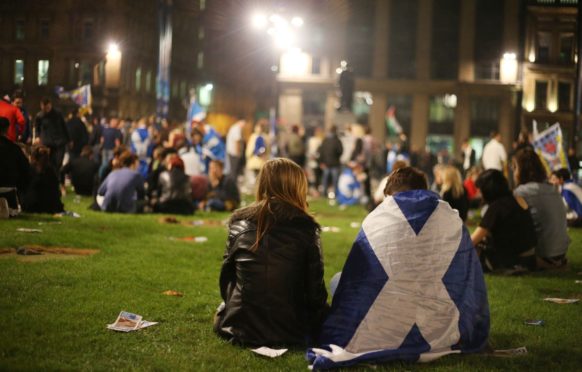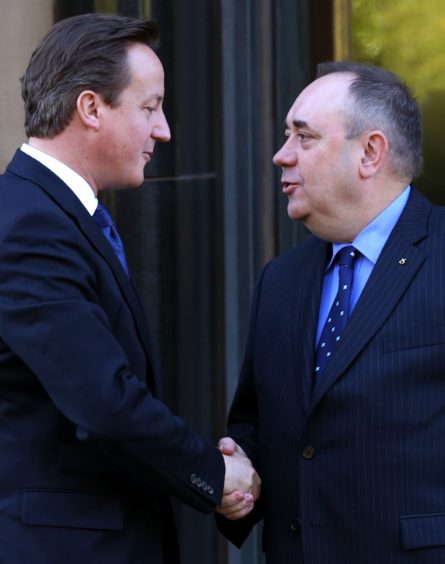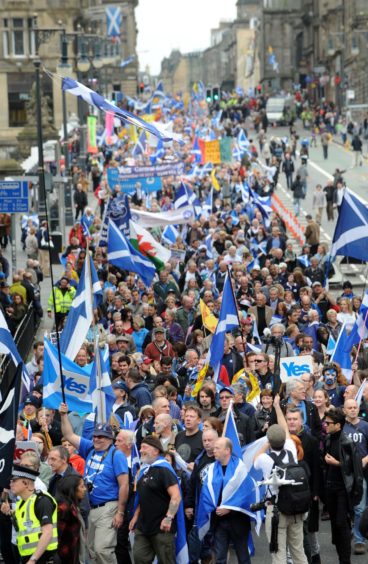Welcome to the non-revolution. We vote Nat because it’s safe, and so invite great change. But, in truth, expect continuity.
Thursday’s election (May 6) will likely result in an SNP majority or an independence majority. That suggests Indyref2 and independence is imminent. Neither are coming soon.
The precedent is the 2011 result that led to the 2014 referendum. After the landslide, the Scottish Government did not know how it would hold a referendum. The power lay, and lies, with Westminster.
What followed was a period of bullish public statements and private puzzlement.
This only changed in January 2012 when the prime minister, David Cameron, gave a speech saying there would be a legal vote, following negotiations between Edinburgh and London.
Those negotiations were led by the official Ken Thomson for the Scottish Government and Ciaran Martin for the UK. Thomson is still in post. Martin has moved on but published a paper about the experience some weeks back.
In it he reveals the UK was at a loss to know the right thing to do. As the Scottish Government special advisor on the matter, I can report we were no clearer on the legal thing to do.
The precedent is that if the SNP win an outright majority, negotiation will follow between Edinburgh and London on the vote. Once agreed, Holyrood and Westminster would approve the deal.
Tory sources let it be known some weeks back that in the event of an SNP majority, Prime Minister Johnson might hold a snap referendum. Precedent suggests he cannot do this.
It also suggests any ‘wildcat’ vote by Holyrood is baloney. Both parties have to agree.
A question of rolls
Johnson could try to impose a referendum on Scotland, but as the machinery to hold a vote in Scotland is under the command of the Scottish Government, it’s not practical.
It’s important to remember that the electoral roll for a Scotland-only vote is the regional government roll used for local council and Holyrood elections.
The PM could try to use the powers and machinery associated with the national roll used for UK general elections. To do that, he’d have to either allow voters across the UK to be involved, or invent a wheeze which applied UK general election rules to Scotland only.
Who gets a say?
That opens up the question of who is eligible to vote. For the first Indyref, the Holyrood roll was chosen because it is limited to people who are resident in Scotland.
I have since seen this described as coup for the Scottish Government negotiators. It certainly suited us, but the UK saw it as the practical option. Crucially, the first referendum was a contest between the SNP on one side, as the majority party, and the UK.
That may not be the case this time. If the Indy majority is made up of two or three parties, then the proposition is confused.
At the last TV debate, the Greens and the SNP clashed on currency. Electoral law operates to the principle that things should be as simple as possible. More than one vision of independence is not simple.
Therefore it’s quite possible that an agreed position from any Indy coalition might be demanded by the UK.
In 2011 the white paper came long after the Edinburgh Agreement. It might be the other way round this time. That would prove very challenging for the Yes camp.
To ask them to arrange the referendum and the white paper, and by inference, Indy itself is like asking the marketing department at NASA to build the rockets
Where the Scottish Government did triumph last time was negotiating the right to set the question and the date. It allowed the SNP to control the pace of the story – a gift for politicians.
The pro-independence majority will want to retain that because at heart their proposition is superficial. To ask them to arrange the referendum and the white paper, and, by inference, Indy itself is like asking the marketing department at NASA to build the rockets.
Nicola Sturgeon has gone out of her way in this campaign to underline this risk. She says the cost of Indy is unknown, the process of rejoining the EU up for debate and that previous assumptions by the Growth Commission are out of date.
It is not a strong position to negotiate terms from.
This matters because, unlike last time, the Union is a much nastier beast. Beware the four Bs – Brexit, Belfast, Boris and Britain.
Brexit means the UK Government are leaps and bounds better prepared than a decade ago. Officials and politicians are more savvy, and more sure of themselves.
Belfast is the consequence of Brexit going wrong. There are riots on the streets of Northern Ireland because the people were lied to. Scotland’s choice will resonate across the isles.
B also stands for Biden and Berlin
Which leads to Boris. He did the lying. His posture is one of provocation. Precedent might go to hell, sometime on polling day.
And finally Britain. Scotland’s independence means the end to all that. Is that really what President Biden, or Merkel’s successor in Berlin want? Is it something the SNP are remotely prepared for?
We know “global Britain” Johnson will fight tooth and nail to stop it.
May 6 will sound like revolution. Expect more of the same.




